Premier Li Keqiang Meets the Press: Full Transcript of Questions and Answers

Cai Xin: The Chinese government took a series of steps to reduce taxes and fees. However, some business people still feel that the tax burden on companies is quite heavy. This year the government plans to implement deeper tax and fee cuts. I would like to ask if you think real benefits can be truly delivered to companies, and is our country’s public finance sustainable?
Premier Li: In the past several years, we worked to replace business tax with value-added tax. For the past three years, we cut taxes by three trillion yuan, or one trillion on an average annual basis. This is fairly large-scale tax reduction. This year we will implement larger-scale tax and fee cuts. We will make reductions in the VAT and employers’ contributions to the basic pension insurance scheme. This will deliver a dividend of as much as two trillion yuan to companies. It is an important measure for countering the downward pressure.
This is also a fair and efficient policy option. The same rules will be enforced and companies under all types of ownership will stand to benefit as equals. The policy will reach all market players directly. The plan is to cut VAT rates starting from 1 April, and the social insurance contribution rate from 1 May. No other way may work as fairly and efficiently as this one for companies.
Our larger-scale tax and fee cuts are a very important reform measure and a crucial decision. Before we took this decision, we did thorough calculations. In the past, there were several different plans under consideration. For example, one of the plans was to cut the VAT rates by just one percentage point each year in the following several years. But that may not bring as many benefits to companies as the current plan. Under the current plan, the VAT rate for the manufacturing sector will be cut by three percentage points. The manufacturing sector accounts for close to 60 percent of all VAT. For construction and related sectors, the VAT rate will be cut by one percent point. For other industries, we will also work to ensure that the tax burden on companies will only go down, not up. Due to the setup of the tax code, with fewer deductions, the tax payments of some sectors may somewhat increase. To address this problem, we will make further tax deductions. In this process, the tax burden on all micro, small and medium-sized companies will be significantly eased. All in all, as I said before, taxes levied on companies will only come down instead of going up. Moreover, employers’ contributions to the basic pension insurance scheme will be cut from 20 percent to 16 percent.
Cutting taxes means smaller fiscal revenues. This year, our fiscal spending will grow in tandem with the GDP growth rate. We also need to ensure that government spending in key areas related to people’s lives and in fighting the three critical battles will increase. Then it begs the question: where does the money come from? Only increasing the budget deficit ratio by 0.2 percent point is not enough to make up for the shortfall. The answer is: the government will tighten its belt and cut back on its general expenditures. At the same time, certain state-owned financial institutions and enterprises directly under the central government will be asked to turn in a larger share of their profits to the state coffers. The central government will also take back those fiscal funds that have long stayed unused. Through these means, we have put together one trillion yuan. Local governments also need to do their homework and contribute, but for localities in the central and western regions, transfer payments from the central government will be made. Digging into the government’s own revenue stock for slashing taxes and fees would be like the government turning the blade of a knife to itself, which requires significant self-sacrifice. That is why I said this is a key reform that requires exceptional courage and determination.
You asked if our public finance is sustainable. Let me tell you that the government has done its due diligence. We are going to cut VAT rates for the manufacturing and other basic sectors. And we are going to make things much easier for small and medium-sized companies, the largest providers of jobs in our country. They will see their taxes meaningfully reduced. This will create a more enabling environment for companies, and also help to expand our tax sources. When we started with the VAT reform several years ago, government revenue also declined. However, it didn’t take long for it to increase again, as the tax base expanded. This is also a reform that will make adjustments to the structure of our national income distribution. By expanding the share of companies therein, we will create more jobs and put more money in our people’s pockets. To do this, the government must live on a tight budget, and let companies benefit more. We must dig into the government’s own pockets, even if this involves offending people. This is actually helpful for keeping our public finance sustainable. As a matter of fact, our ability to keep China’s public finance sustainable may be called into question if the above measures are not taken. Such measures are not taking an overdraft on our future, but nurturing a better tomorrow.
So, these heavyweight policies and measures are all set, relevant departments and governments at all levels must fully deliver those policies and measures. There must be no lip service. We will let market players test their actual effects and there must be no arbitrary charges levied in disguised forms. Our end goal is to deliver concrete benefits to companies and market entities.

Follow us on WeChat
京ICP备18041594号-1
京公网安备 11010202005508号

Follow us on WeChat



